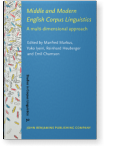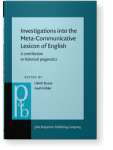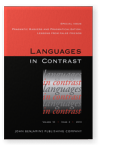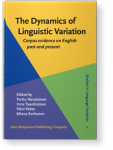Tine Defour
List of John Benjamins publications for which Tine Defour plays a role.
2012 The pragmaticalization and intensification of verily, truly and really: A corpus-based study on the developments of three truth-identifying adverbs Middle and Modern English Corpus Linguistics: A multi-dimensional approach, Markus, Manfred, Yoko Iyeiri, Reinhard Heuberger and Emil Chamson (eds.), pp. 75–92 | Article
This article discusses the semantic-pragmatic developments of three adverbs from the semantic field of veracity, verily, truly and really. They share a number of truth-assessing functions in present-day discourse but show significant differences in terms of frequency and in their individual range… read more
2012 Verbs of answering revisited: A corpus-based study of their pragmatic development Investigations into the Meta-Communicative Lexicon of English: A contribution to historical pragmatics, Busse, Ulrich and Axel Hübler (eds.), pp. 223–246 | Article
2010 Degrees of pragmaticalization: The divergent histories of ‘actually’ and actuellement Pragmatic Markers and Pragmaticalization: Lessons from false friends, Lauwers, Peter, Gudrun Vanderbauwhede and Stijn Verleyen (eds.), pp. 166–193 | Article
Despite their formal resemblance, the English word ‘actually’ and the French word actuellement fulfil very different semantic-pragmatic functions in their present-day usage. In most cases they are ‘false friends’, as they overlap in meaning in a very limited number of contexts only. Since these… read more
2008 'And so now…': The grammaticalisation and (inter)subjectification of now The Dynamics of Linguistic Variation: Corpus evidence on English past and present, Nevalainen, Terttu, Irma Taavitsainen, Päivi Pahta and Minna Korhonen (eds.), pp. 17–36 | Article
In addition to its primary temporal meaning, the adverb now displays a variety of pragmatic meanings in present-day English. Now serves as a means to structure topic changes or to emphasise different steps in an argumentation, providing “a temporal index for the world within the utterance”… read more
2008 The speaker’s voice: A diachronic study on the use of well and now as pragmatic markers English Text Construction 1:1, pp. 62–82 | Article
In present-day English, well and now function as pragmatic markers with a wide range of text-structuring and interpersonal meanings. Both markers are used as topic-changers and serve as a means to signal speaker-attitudes or to gain a shared level of understanding between speaker and addressee on… read more




